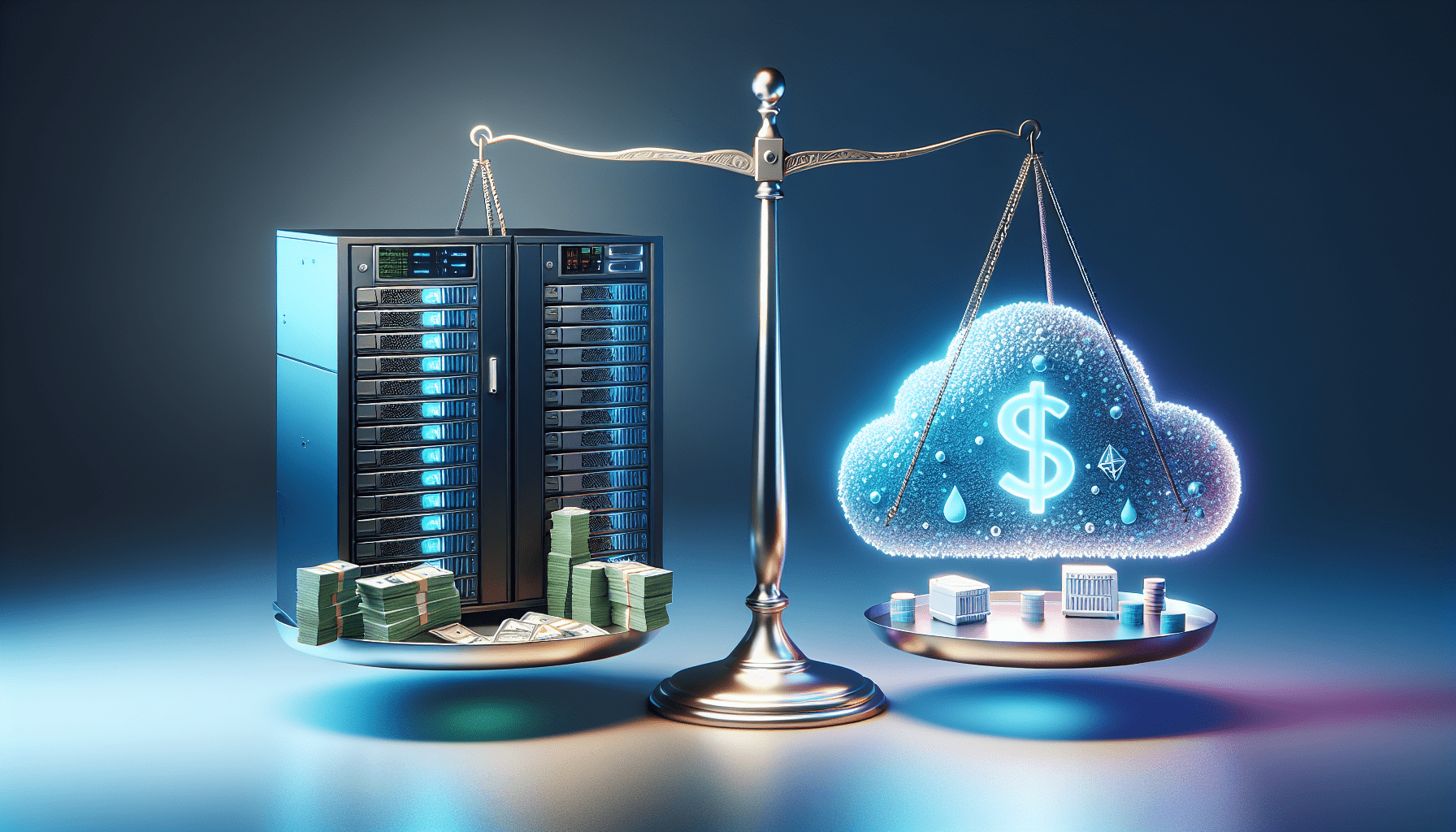Choosing the right server for your website or online business is a crucial decision that can impact its performance and success. In this article, we explore the pros and cons of using a dedicated server versus a virtual private server (VPS). By examining the benefits and drawbacks of each option, you can make an informed choice that aligns with your specific needs and goals. Whether you prioritize control, flexibility, scalability, or cost-effectiveness, this article will provide you with valuable insights to help you navigate the world of server hosting.
Resource Allocation
Dedicated Server
A dedicated server is a physical server that is exclusively allocated to one user or organization. With a dedicated server, you have full access to all of its resources, including the CPU, RAM, storage, and bandwidth. This means that you don’t have to share these resources with anyone else, allowing for greater control and performance. You can allocate resources as per your needs and scale them up or down as required. This makes a dedicated server an ideal choice for businesses or individuals with high resource requirements.
Virtual Private Server (VPS)
A virtual private server (VPS) is a virtual machine that runs on a physical server. It provides you with a dedicated portion of the server’s resources, allowing you to have more control and flexibility compared to shared hosting. While you still share the physical server with other users, the resources allocated to your VPS are isolated and dedicated solely to you. This means that you have more control over your resource allocation but with some limitations compared to a dedicated server.
Scalability
Dedicated Server
Scalability is one of the crucial factors to consider when choosing a hosting solution. With a dedicated server, you have the ability to scale your resources quickly and easily. Since you have exclusive access to the server’s resources, you can upgrade your hardware, add more storage, or increase your bandwidth capacity without any limitations. This makes a dedicated server a preferred choice for businesses experiencing rapid growth or expecting high levels of traffic.
Virtual Private Server (VPS)
While a VPS offers some level of scalability, it is limited compared to a dedicated server. The resources allocated to your VPS are predetermined, and you have a specific limit on how much you can scale. While you can still upgrade your plan and allocate more resources, there may be some downtime during the process. However, for most small to medium-sized businesses, the scalability provided by a VPS is more than sufficient.
Performance
Dedicated Server
When it comes to performance, a dedicated server shines. Since you have exclusive access to all of its resources, you can expect excellent performance and fast loading times. With a dedicated server, you don’t have to worry about other users’ activities affecting your website’s performance. This is particularly important for resource-intensive websites, such as e-commerce platforms or applications that require high processing power.
Virtual Private Server (VPS)
A VPS offers decent performance, but it may not match the level of a dedicated server. Since you are sharing the physical server’s resources with other users, there is a possibility of resource contention. If one user’s website or application is utilizing a significant portion of the resources, it can potentially impact the performance of other VPS instances on the same server. However, for most small to medium-sized websites, a VPS provides satisfactory performance levels.
Cost
Dedicated Server
A dedicated server tends to be more expensive compared to a VPS. Since you have exclusive access to all of the server’s resources, you are responsible for the entire cost of the hardware, maintenance, and management. This makes it a more suitable option for larger businesses with higher budgets. However, the increased cost is justified by the level of control and performance that a dedicated server offers.
Virtual Private Server (VPS)
A VPS is more affordable compared to a dedicated server. Since you only have access to a portion of the physical server’s resources, the cost is shared between multiple users. This makes it an attractive option for small to medium-sized businesses that require a higher level of control and performance than shared hosting but at a lower cost than a dedicated server.
Security
Dedicated Server
Security is a crucial aspect of any hosting solution, and a dedicated server offers a high level of security. Since you have exclusive control over the server, you can implement strict security measures, such as firewalls, intrusion detection systems, and encryption protocols. Additionally, since you do not share the server’s resources with other users, there is a reduced risk of your website or application being affected by the activities of others. This makes a dedicated server an excellent choice for websites or applications that handle sensitive data or require a secure environment.
Virtual Private Server (VPS)
While a VPS provides a certain level of security, it may not be as secure as a dedicated server. Since you are sharing the physical server with other users, there is a greater risk of security vulnerabilities. However, reputable VPS providers implement robust security measures and offer options such as virtual private networks and advanced firewalls to enhance the security of your VPS. It is important to keep your VPS updated and properly configure security settings to mitigate potential risks.
Control
Dedicated Server
A dedicated server offers the highest level of control over your hosting environment. Since you are the sole user of the server, you have complete control over its configuration, software installations, and customizations. You can choose the operating system, install specific software applications, and customize the server settings according to your requirements. This level of control is particularly beneficial for businesses that require specific software configurations or have unique hosting needs.
Virtual Private Server (VPS)
While a VPS provides a good level of control, it may not offer the same level of flexibility as a dedicated server. Since you are sharing the physical server with other users, there are certain limitations on what you can modify or customize. However, a VPS still allows you to choose the operating system, install software applications, and configure server settings. This level of control is generally sufficient for most businesses, especially those that do not require highly specialized configurations.
Reliability
Dedicated Server
A dedicated server offers a high level of reliability. Since you have exclusive access to the server’s resources, you don’t have to worry about others’ activities causing downtime or performance issues. Additionally, dedicated servers often come with robust hardware configurations, redundant power supplies, and network connections, ensuring maximum uptime for your website or application. This makes a dedicated server an ideal choice for businesses that require continuous availability and minimal downtime.
Virtual Private Server (VPS)
A VPS offers good reliability but may not match the level of a dedicated server. Since you are sharing the physical server with other users, there is a possibility of resource contention or performance issues caused by other VPS instances on the same server. However, reputable VPS providers ensure that the physical servers have redundancy measures in place, such as redundant power and network connections, to minimize downtime. For most businesses, the reliability provided by a VPS is sufficient.
Management
Dedicated Server
With a dedicated server, you have full control over the management of your hosting environment. This means that you are responsible for server setup, software installation, security updates, and ongoing maintenance. While this level of control offers great flexibility and customization, it also requires technical expertise and time commitment. If you have the technical know-how and resources to manage a dedicated server, it can be a rewarding option.
Virtual Private Server (VPS)
A VPS offers a balance between control and management ease. The VPS provider takes care of the server setup, hardware maintenance, and network infrastructure, allowing you to focus on managing your website or application. While you still have control over the software installations and server settings, the technical aspects of the server management are handled by the provider. This makes a VPS an excellent choice for businesses that require control over their hosting environment but do not have the resources or expertise to manage a dedicated server.
Customization
Dedicated Server
If you require a high level of customization and have specific software or hardware requirements, a dedicated server is the way to go. With a dedicated server, you have complete control over the server’s configuration, allowing you to install custom software, integrate specialized hardware, and tailor the server settings according to your needs. This level of customization is particularly beneficial for businesses with unique hosting requirements or those that rely on specific software applications.
Virtual Private Server (VPS)
While a VPS provides a reasonable level of customization, it may not match the flexibility of a dedicated server. Since you share the physical server with other users, there are limitations on what you can modify or install on the server. However, a VPS still allows you to choose the operating system, install software applications, and configure server settings based on your requirements. For most businesses, the level of customization offered by a VPS is sufficient.
Technical Expertise
Dedicated Server
Managing a dedicated server requires a certain level of technical expertise. Since you have complete control over the server’s configuration and management, you need to have knowledge of server administration, software installations, security protocols, and troubleshooting. This means that you either need to have an in-house IT team or outsource the management of your dedicated server to a professional server management company. While the technical requirements may be a challenge for some, the level of control and performance offered by a dedicated server makes it worth considering.
Virtual Private Server (VPS)
Compared to a dedicated server, managing a VPS requires less technical expertise. The hardware and network infrastructure are taken care of by the VPS provider, allowing you to focus on managing your website or application. While you still have control over the server’s configuration and software installations, the technical aspects of the server management are handled by the provider. This makes a VPS a suitable choice for businesses that do not have dedicated IT resources but still want control over their hosting environment.
In conclusion, both dedicated servers and virtual private servers (VPS) have their own set of advantages and drawbacks. The decision of which option to choose ultimately depends on your specific needs, budget, and technical expertise. If you require full control, high performance, and scalability, a dedicated server might be the right choice for you. On the other hand, if cost-efficiency, ease of management, and scalability within certain limitations are your priorities, a VPS can be a suitable option. Consider the pros and cons outlined in this article and make an informed decision based on what aligns best with your requirements as a business or individual.






